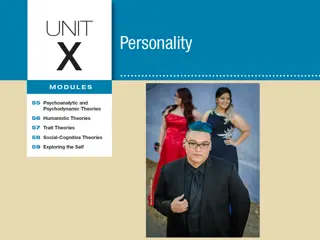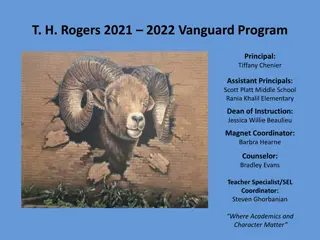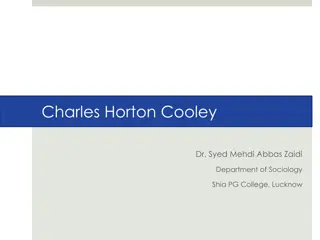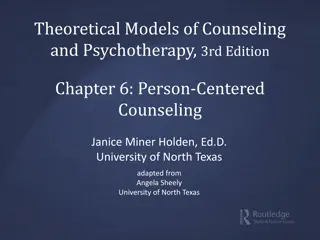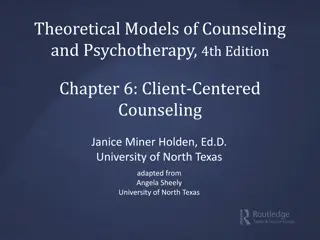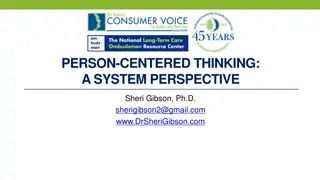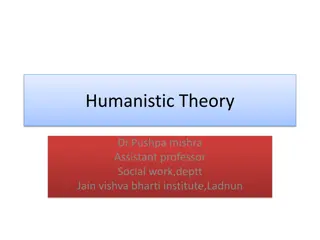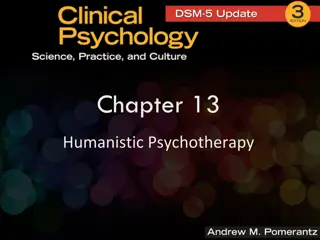Carl Rogers and the Self-Concept Theory
Carl Rogers, a prominent figure in personality theory, emphasized individuals' constructive potential and the impact of their subjective experiences on personality development. He viewed individuals as goal-directed and capable of change, with the environment playing a facilitating or inhibiting role. Rogers' humanistic-phenomenological approach focused on self-perception, self-concept, and self-structure, highlighting the importance of unconditional acceptance for personal growth. His theory, non-deterministic in nature, emphasized individuals' freedom to change and realize their potential within an accepting social environment.
Download Presentation

Please find below an Image/Link to download the presentation.
The content on the website is provided AS IS for your information and personal use only. It may not be sold, licensed, or shared on other websites without obtaining consent from the author. Download presentation by click this link. If you encounter any issues during the download, it is possible that the publisher has removed the file from their server.
E N D
Presentation Transcript
CARL ROGERS The Self-concept Theory (1902-1987)
Background Personality theory is based on 3 assumptions: 1. The individual has constructive potential 2. The nature of the individual is basically goal-directed 3. The individual is capable of changing Emphasises the importance of people s subjective experience of themselves and its influence on personality The individual is the control figure in the actualisation of her potential and the environment can facilitateor inhibitthis Potential is actualized in an atmosphere in which the individual is unconditionally accepted and feelsfree todevelop withoutexternalrestrictions He was exposed to scientific thinking from an early age, farm life expose him to divergent interests, came fromnarrow-mindedconservativehomewithlittle socialcontactwithothers
View of the person His fundamental view of the person is humanistic-phenomenological Discovered characteristics which seemed inherent in people; positive, forward-thinking, constructive, realistic, trustworthy Individuals not just active role-players in their own functioning, can also be trusted to follow a positive course in order to realise their potential and to become the best that they can be Healthy people are ware of their positive and negative attributes His theory is not deterministic because behaviour is determined by the choices of the individual Environment plays no more than a facilitating or inhibiting role The view of themselves and their subjective experience of themselves also play a part Ideal environment see self exactly as they are, and all potential can be realised The social environment places acceptance conditions on the individuals and they then act in accordance to these standards and not their own potentials The individual has freedom to change, but they must experience unconditional acceptance There are 19 propositions in which he sets out certain assumptions which are fundamental to his approach The organism (person), interacts with phenomenal field (total experiential world) Self-perception self, self-concept and self-structure
Structure of personality Organism Phenomenal Field Self Concept The total individual with all physical and psychological function The central figure who interacts constantly with the dynamically changing world in which she lives Each organism s behaviour is determined by the specific subjective perception of this world and the meaning the individual attaches to this The totality of a person s perceptions and experiences includes Perceptions of OBJECTES or EVENTS OUTSIDE the person and the meanings attached to them INNER EXPERIENCES and meanings that relate to the person herself Differentiated part of phenomenal field which concerns the person herself Organised consistent conceptual gestalt composed of characteristic of the I or me and the perceptions of the relationship of the I or the me to others and to various aspects of life, together with the values attached to these perceptions, a process but at any given moment a specific entity The PICTURE which individuals have of themselves Represents the person sconscious experience of herself Relatively stable pattern of integrated perceptions ;it is still flexible and changeable The IDEAL self is the concept the individual would most like to have When a person is psychologically healthy this ideal self is realistic and in harmony with the self- concept allowing for guidelines towards attainable growth and development When a person is psychologically unhealthy, the self-concept and ideal self do not correspond (extreme forms of the ideals set by OTHERS for the person, not in tune with the real potential)
Dynamics of the personality The basic motive which underlies all behaviour is the actualizing tendency There are also 2 other needs that underlies and drive behaviour; the need for positive regard and the need for positive self-regard Self-concept plays a role as well with experiences and behaviour Congruence and incongruence
Actualising tendency Believe the purpose of life is to become that self which one truly is Actualizing tendency is a inherent tendency of organisms to maintain themselves andtoexpand/grow in order tobecome what they can be Therapists rely on this inherent striving for progress to lead their clients towards discovering their ownpotential andhelp them develop that potential fully Rogers use the term actualising and not self-actualising
Need for positive regard (from others and self OTHERS basic need for approval, appreciation, love, admiration and respect To fill this need a person may adopt the wishes and values of another as his won and behave in a particular way to earn esteem SELF require positive regard from others in order to esteem and to feel positive about themselves Play an important role in determining individual behaviour
Congruence and Incongruence Incongruence Congruence No difference between experiential world and view of self When experiences contrary to the self-concept form a part of the phenomenal field Open to and conscious of all experiences and incorporates them into self-concept Follow only conditions of worth See self as they really are and self- concept corresponds with actual potential Distorted experiences and denied experiences Behave in a way that maintains and enhances the self-concept Conditions of worth greatly influence congruence
Role of self-concept in experience & behaviour Three ways in which people deal with experiences; ignore, symbolize (allow into consciousness), refuse to symbolize Specific needs of the individual and self concept determine which possibility is most appropriate Ignore = at that moment the experience is irrelevant to needs Symbolized= when experiences correspond with needs Allowed into consciousness = when experiences correspond with self concept Denied access to consciousness = experiences which are denied or distorted because they are contrary to self concept Unconsciously denial and distortion can also take place when the organism ahs a need or experience which cannot be symbolized because it is completelyincongruentwithself-concept,then self-conceptisthreatened andmustbeprotected Subception = the experience not congruent with self-concept is traced or selected on unconscious level and defended against (might be accompaniedbyanxiety) Behaviour Most of what a person does, corresponds with the self-concept Self concept plays an important role in determining behaviour A problem arises when the needs and the self-concept do not correspond Individuals function ideally when their self concepts are congruent with their needs and feelings
Development of the personality Three ways in which people deal with experiences; ignore, symbolize (allow into consciousness), refuse to symbolize Specific needs of the individual and self concept determine which possibility is most appropriate Ignore = at that moment the experience is irrelevant to needs Symbolized= when experiences correspond with needs Allowed into consciousness = when experiences correspond with self concept Denied access to consciousness = experiences which are denied or distorted because they are contrary to self concept Unconsciously denial and distortion can also take place when the organism ahs a need or experience which cannot be symbolized because it is completelyincongruentwithself-concept,then self-conceptisthreatened andmustbeprotected Subception = the experience not congruent with self-concept is traced or selected on unconscious level and defended against (might be accompaniedbyanxiety) Behaviour Most of what a person does, corresponds with the self-concept Self concept plays an important role in determining behaviour A problem arises when the needs and the self-concept do not correspond Individuals function ideally when their self concepts are congruent with their needs and feelings
PAST PAPERS & TUTS 2016-2011
Which one of the following most accurately expresses the phenomenological dimension of Rogers view of the person? Thabo breaks his relationship off with Tracey as she is always limiting his freedom tobe who he trulyis. 1. Gerald values his mother s opinion of him as it provides him with an objective viewof himself. 2. Lesiba has always wanted to be a teacher ever since he was a young boy and his mother appreciates the view he has ofhimself. 3. Paul s sister subjectively experiences him as a compassionate person, which has stronglyinfluenced Paul sview of their mother ascompassionate. 4. ANSWER: 3
The phenomenological dimension highlights individuals subjective experiences of their worlds and how their view of themselves impacts on their behaviour. Therefore, in order for others/therapists to understand and facilitate individuals towards growth and optimal development, it will be necessary to understand their world from their particular viewpoint. Lesiba subjectively experiences himself as wanting to be a teacher. This view of himself (his self-concept) is what his mother appreciates and accepts. According to Rogers theory, individuals who receive unconditional positive regard will develop self-concepts that are congruent with their potential and will actualise their potential. Lesiba will, therefore, according to Rogers, become a teacher as his mother has given him unconditional positive regard. It is clear that Alternative 1 has more to do with conditional positive regard which Thabo receives from Tracey than with his subjective experience of himself. Alternative 2 does not fit with Rogers theory which focuses on a person s subjective experience of him or herself rather than needing an objective view of oneself from others as stated in this alternative. Alternative 4 is also incorrect. What is important in Rogers theory is a person s subjective experience of him- or herself rather than the experience of oneself from someone else s vantage point.
As a young boy, Paul loved building things and taking them apart. As an adult, Paul decided to follow a career in engineering. In terms of Rogers theory, which one of the following deductions made from this story, is INCORRECT? His parents provided him with unconditional positive regard. 1. His parents provided him with conditional positive regard. 2. His behaviour, to follow a career in engineering, is congruent with his true organismic potential. 3. He is actualising his potential by following a career in engineering. 4. ANSWER: 2
In this story, Pauls true organismic potential refers to his practical-technical skills (he loves building things and taking them apart). This is also the way he sees himself - his self concept is therefore congruent with his true potential. According to Rogers theory, a person will actualise his or her potential if that person receives unconditional positive regard from his or her significant others otherwise the need for positive regard tends to override the actualising tendency. It is therefore possible to deduce that Paul received unconditional positive regard from his parents, and not conditional positive regard. He was therefore able to behave in accordance with his self concept and follow a career in engineering which is congruent with his true potential. He actualises his potential. The only alternative which is INCORRECT in terms of this story is Alternative 2, which makes it the correct answer to this question.
Alan has entered the stage of the so called terribletwos with the development of his will power leading him to throw tantrums. Which one of the following do you think most accurately reflects the advice that Rogers would give Alan s parents? In order to accept Alan you need to accept his behaviour and find another way in which to cope with your own frustration at his tantrums, as opposed to limiting his free expression of self. 1. Let Alan know that you understand his feelings that he has the right to feel that way and that you love him no matter what, but that his tantrum behaviour is not acceptable. 2. Alan must be allowed to express all of his emotions openly, as only the unlimited expression of all his emotions will enable him to experience a sense of freedom. 3. You should show resignation and defeat in response to Alan s tantrums, as only when he sees that you feel powerless to change his behaviour will he begin to feel guilty and start choosing more constructive responses. 4. ANSWER: 2
The correct answer is Alternative 2. This response conveys empathy, respect, and unconditional positive regard, while allowing Alan s parents to remain congruent in terms of their own values about what is acceptable and unacceptable behaviour. Alternative 1 is incorrect. Rogers distinguishes between acceptance of the person and acceptance of the behaviour. Children need to feel accepted in a consistent way but specific behaviour can be disapproved of. Alternative 3 is also incorrect. Rogers did not say that unconditional positive regard is to accept anything and everything. Alternative 4 is incorrect as well as it seems that what the parents will convey to the child is conditional rather than unconditional positive regard. It is also doubtful whether a child of two will feel guilty and start choosing more constructive responses
Thandeka has been in corporate banking for the better part of her adult working life. She has been very successful and has advanced more rapidly than many of her colleagues. Despite her achievements, however, she does not feel fulfilled through her work. She feels more drawn to helping people realise their potential and workshopping with them around personal growth issues. Eventually Thandeka takes the leap and resigns from her well-paid position in the banking industry to pursue her dream. While she feels apprehensive and fears some of the consequences of her choice, she also trusts implicitly that this is the right course for her to be taking. Which one of the following statements about the fully functioning person according to Rogers best describes Thandeka? Thandeka has gone through the process of growth required in order to realise her full potential and can expect to remain in the static bliss of the good life for the rest of her life. 1. Thandeka is functioning fully as she demonstrates the basic characteristic of being more open to society s needs than her own, thereby enabling her to sacrifice her financial success in order to contribute more meaningfully to her community. 2. Thandeka felt free to make this choice, as she feels increasingly able to trust her sense of what is right for herself as opposed to depending on existing codes and norms, which may dictate that a secure job is the better option. 3. Thandeka demonstrates the characteristic trait of the fully functioning person by being increasingly open to defending against being a conformist. In this manner she has managed to close herself off to certain external experiences in order to remain open to her internal experience of wanting to make this career change. 4. ANSWER: 3
The correct answer is Alternative 3. According to Rogers, a fully functioning person is open to experience, lives an increasingly existential lifestyle, demonstrates freedom of choice, an increasing organismic trust, adjusts to changing environments and lives in a creative way, can be trusted to act positively and constructively, and will lead a rich, full life. Thandeka allows all experiences into herself concept and by doing so, has got to know herself better and to acknowledge and use her talents and abilities, choose constructive action and realise her potential. Alternative 1 is incorrect. Rogers is quite emphatic that the good life is not a static state but a process, in which the organism continuously strives to fulfil its potential. Alternative 2 is also incorrect. The emphasis is on the person or organism remaining open to experience and not on being more open to society s needs which could lead to the incorporation of the values of society into a person s self concept which would lead to defensiveness and not openness. Alternative 4 is incorrect. Again, being open to experience rather than closed and defensive, describes Thandeka, a fully functioning person, according to Rogers.
Gadihele believes that she is from another planet and has come to visit the earth in order to save its inhabitants. She tells you that the reason her psychiatrist says she is psychotic is because she speaks in a language that human beings do not have the intellectual capacity to understand, and he is too defensive to admit his own ignorance and so rather regards her as having a mental disability. How would Rogers explain Losita s behaviour? Rogers would understand Gadihele s view of her psychiatrist as defensive, as her psychiatrist would need to protect his self concept against the incongruent experience that he may not be intelligent. a. The correct answer is: (a) & (b) 1. 2. (b) & (c) Rogers would explain Gadihele s psychosis as arising from a defencelessstate in which her incongruities became conscious, with her personality becoming disorganised as a result. b. (c) & (d) 3. 4. (b) & (d) Rogers would view Gadihele s behaviour as proof of the malfunctioning that can occur when a person s defence mechanisms no longer function effectively. c. Rogers would regard Gadihele s behaviour as resulting from the use of denial as a way of dealing with her misconceptions rather than the more effective defence mechanism of distortion. d. ANSWER: 2
The correct answer is Alternative 2 containing Statements (b) and (c) that clearly illustrate the severe degree of malfunctioning in Gadihele, which could be referred to as psychotic. Please note, however, that Rogers was opposed to labels. Statements (a) and (d) are clearly incorrect. Statement (a) is incorrect because the emphasis is on Gadihele s defenceless state and malfunctioning, and not on her psychiatrist s self concept. Statement (d) is incorrect as both defence mechanisms, denial and distortion, are used to protect the self concept. One is not better than the other. They merely serve different functions.
According to Rogers theory, conditions of worth originate ANSWER: 2
Which of the following defence mechanisms does Rogers theory refer to? Denial and Subception 1. Subception and distortion 2. Denial and distortion 3. Incongruence and denial 4. ANSWER: 3
According to Rogers, the new-born baby behaves according to The wishes of others because the baby cannot yet make his or her own decisions 1. The undifferentiated phenomenal field 2. His or her self concept 3. The organismic evaluation process 4. ANSWER:2
According to Rogers theory, which one of the following statements regarding the actualisation tendency is true? ANSWER:2
According to Rogers theory, self-actualization refers to ANSWER: 4
Julian dislikes taking risks and prefers playing chess. His father encourages him, however, to take part in hang gliding with him. Julian does not really enjoy the sport, but participates to please his father. According to Roger s theory, Julian s need for positive regard is stronger than his actualising tendency 1. Julian is fulfilling his true potential by taking risks 2. Julian is developing that side of his potential that is underdeveloped 3. Julian experiences unconditional positive regard from his father. 4. ANSWER: 1
According to Rogers, the self-concept is: . A conceptual gestalt composed of conscious and unconscious experiences which are allowed into consciousness a. That portion of the person s phenomenal field which concerns the person him/herself b. A little man in the head who controls a persons behaviour c. Fluid and changes continuously as a result of new experiences d. A static pattern of integrated perceptions. e. The correct answer is: 1. (a), (b) & (d) 2. (b) & (d) 3. (a), (c) & (e) 4. (b), (c) & (e) ANSWER: 1
Mary sees herself as a faithful wife who could not possibly be attracted to any other man than her husband. Mary has included the value of her mother of if you are a good wife you will not be attracted to another man in her view of what a good wife should be. When she meets her husband s friend, Bob, she experiences sexual feelings towards him. According to Roger s theory, Mary Received unconditional positive regard from her mother a. Received conditional positive regard from her mother b. Incorporated a condition of worth into her self-concept c. Is likely to become a fully functioning person d. The correct answer is: 1. (b) 2. (b) & (c) 3. (a) & (c) 4. (a) & (d) ANSWER: 2
In terms of Rogers theory, Mary is likely to function . Congruently because she will tend to behave in accordance with her self-concept 1. Incongruently because her self-concept differs from her organismic experiences 2. Congruently because her self-concept and true organismic potential are in accordance with one another 3. Incongruently because her sexual feelings for Bob are in line with her true organismic experiences 4. ANSWER: 2
In terms of Rogers theory, how is Mary is likely to deal with her feelings toward Bob? Mary will feel sexual attraction towards Bob and permit these sexual feelings into her consciousness 1. Mary will defend her organismic experiences by finding socially acceptable ways to express her sexual attraction towards Bob she will be polite and friendly towards him 2. Mary will allow her sexual feelings towards Bob into her self-concept 3. Mary will defend her self concept off being a good wife by denying her sexual feelings for Bob, or by saying, for example, that her sexual feelings for Bob in fact show that she is sexually attracted to her husband. 4. ANSWER: 4
Maria has studied Rogers theory and wants to apply this knowledge to her own relationships. She decides to approve of anything that her children do. Which one of the following statements accurately depicts Maria s position? Maria thoroughly understands Roger s theory because she realises that a healthy relationship is founded on unconditional positive regard 1. Maria thoroughly understands Rogers theory because she thinks that only if she approves of anything her children do, will they feel accepted 2. Maria does not show thorough understanding of Roger s theory because she confuses conditional and unconditional positive regard 3. Maria does not show thorough understanding of Roger s theory because she confuses unconditional positive regard for the person, with acceptance of any kind of behaviour. 4. ANSWER: 4
Sarah sees herself as a good cook. When she burns the supper she blames a friend who phoned while she was preparing the meal, and the time when she put too much salt in the veggies, she said that the salt is more concentrated today than it uses to be. Sarah regards herself as a good cook. Which statement regarding Sarah is correct in terms of Roger s theory? Sarah uses defence mechanisms to improve her functioning 1. Sarah denies her unpleasant experiences and expands her self-concept 2. Sarah distorts her experiences to protect her self-concept 3. Sarah functions congruently because she protects her cooking talents 4. ANSWER: 3
According to Rogers theory, what differentiates humans from other organisms? Only humans possess the ability to actualise their potential, whereas plants and other animals do not share the actualising tendency with humans 1. Only humans possess the potential for self-actualisation, whereas plants and other animals do not share the self-actualisation tendency with humans. 2. Only humans possess a true organismic potential whereas pants and other animals do not have a genetic potential 3. Only humans require favourable conditions for actualisation whereas plants and animals do not require certain conditions to be present.. 4. ANSWER: 2
According to Rogers theory, organismic trust implies that the person: Trusts him/herself when choosing behaviour appropriate to a specific situation 1. Trusts other people since human nature is inherently constructive 2. Trusts and is open to his/her conditions of worth 3. Trusts and is open to all experiences. 4. ANSWER: 1
Zinzi has the talent to become an artist. She enjoys sculpting and creates beautiful sculptures. She thinks of herself as an artist. Her parents feel that she should pursue a career in the mathematical field. She fails her math test and does not see herself as good in math. Zinzi would be congruent if she decides to . Become an artist 1. Become a mathematician 2. Ignore both her own interest and her parent s wishes 3. Find a career which integrates art and mathematics. 4. ANSWER: 1
Pumi wants to be a good mother. Her view of a good mother is someone who dedicates all of her time and energy to her child. While she would love to continue her studies in art, as she really wants to become a professional painter, she decides to give this up in order to devote herself to her newly born baby. According to Rogers view on the actualising and self-actualising tendencies, Pumi is: Realising her true womanly potential as a mother and therefore demonstrates the actualising tendency 1. Striving for the utmost development of her potential and therefore demonstrates the self-actualising tendency 2. Acting upon her view of what a good mother should be and therefore demonstrates the self-actualising tendency 3. Realising only part of her total potential and therefore demonstrates the actualising tendency. 4. ANSWER: 3
Carl Rogers theory, is regarded as a humanistic theory because he emphasises: Pathological human functioning 1. The role of significant others in learning 2. The constructive potential of the individual 3. The deterministic role of the environment. 4. ANSWER: 3
According to Rogers theory, conditions of worth are: Desirable because they indicate what makes a person acceptable to others 1. Undesirable because they convey the conditions under which a person is judged to be worthy of acceptance 2. The aspects which indicate a person s worthiness 3. The essential aspects in any relationship 4. ANSWER: 2
In terms of Rogers theory, the self-concept: Is a little man in the head which controls a person s behaviour 1. Is a picture a person has of him/herself and the value a person attaches to him/herself. 2. Includes both conscious and unconscious experiences 3. Is fixed which ensures that the person will experience him or herself as the same person throughout the lifespan. 4. ANSWER: 2
In which of the following ways would your response to your partner be the most correct in accordance with Rogers view of the person? You constantly remind your partner how you would like him to interact with your parents, as you know that his own constructive tendencies lead him to want them to like him too 1. You trust that your partner will make the best choices for herself at work so you refrain from offering anything but your support and acceptance of choices she makes 2. You know that your partner is a sensitive person by nature and so you find the most tactful way to share with him any criticisms you may have of his actions. 3. You point out to your partner the ways in which she restricts and limits your freedom, as ultimately the significant others in your environment should always facilitate your ability to realise your true potential. 4. ANSWER: 2
In the table below, column A lists the structural elements of the personality and column B the explanations of each. From the alternatives below select the correct combinations of the items in these two columns. Column A: Structural elements Column B: Explanations a. The organism d. A relatively stable pattern of integrated perceptions, which changeable is also flexible and b. The phenomenal field e. The central figure that interacts constantly with the dynamically changing world. c. The self-concept f. The totality of a person s perceptions and experiences The correct answer is: 1. [a & f], [b & e], [c & d] 2. [a & d], [b & e], [c & f] 3. [a & e], [b & f], [c & d] 4. [a & f], [b & d], [c & e] ANSWER: 3
Susan sees herself as someone who is socially incompetent. Whenever she is in company, she either has very little to say, tends to be rather short with others, or has the knack of rubbing people up the wrong way. In terms of Roger s theory, theses experiences are.. ANSWER: 3
Read the following story and answer the questions: Alan is a very talented soccer player. He loves playing soccer and is encouraged to do so by his parents. Alan is, however, not academically strong and struggles to do well at school. His parents support him where they can in his schoolwork, helping him to choose subjects he most enjoys. Alan sees himself as a good soccer player but as an average scholar who battles with certain subjects. In terms of Rogers theory, Alan has a ____ self-concept 1. 2. 3. 4. A negative An unrealistic A congruent An incongruent Answer: 3
It is clear that Alans parents: 1. Accept him conditionally 2. Accept him unconditionally 3. Set conditions of worth 4. Hinder the actualisation of his potential Answer: 2








